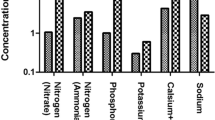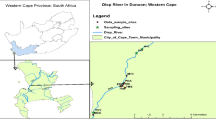Abstract
Pressing water scarcity in Jordan rapidly increases the demands of marginal water resources for the agricultural sector. Water management studies reveal that no single source could fully solve the nation’s water shortage and many integrated actions are needed to ensure water availability, suitability and sustainability. Yet, among these options treated wastewater has the largest potential to augment water supply in the near future, thereby narrowing the gap between available freshwater and total demand. Indeed, treated wastewater could be a valuable source for irrigation in the agricultural sector and an increasing percentage of irrigated areas, especially in the Jordan Valley, are currently using treated wastewater. With a fast growing population and expansion of the irrigated areas to meet food demand, the pressure on water resources in Jordan remains of imminent importance. Hence, an urgent call to analyze the current and potential role of treated wastewater seems justified. Under the umbrella of the project on the Sustainable Management of Available Water Resources with Innovative Technologies (SMART) funded by the German Federal Ministry for Education and Research in Germany, an investigation has been carried out in the Jordan Valley to estimate the current wastewater reuse quantities and the potential to increase its utility for agricultural production. In general, the reuse as percentage of total treatment is applied for national and international comparisons. Yet, this index is of limited use for policy decisions as it does not reflect potentialities of wastewater use. Therefore, this study introduces a wastewater reuse index (WRI) that reflects the actual proportion of wastewater reused from the total generated wastewater. We found that the WRI in Jordan steadily increased from 30% in 2004 to 38 in 2007. Efficient use of treated wastewater requires the application of new technologies in Jordan like dwellings connected to the sewer system, decentralization of treatment plants to rural and urban settlements and prevention of high evaporation rates from stabilization ponds.
Similar content being viewed by others
References
Abdulla F, Eshtawi T, Assaf H (2009) Assessment of the impact of potential climate change on the water balance of a semi-arid watershed. Water Resour Manage 23(10):2051–2068
Abu-Madi M (2004) Incentive systems for wastewater treatment and reuse in irrigated agriculture in the MENA region: evidence from Jordan and Tunisia. TU Delft/ UNESCO-IHE Delft. Delft University. PhD, p 250
Al-Khashman OA (2009) Chemical evaluation of Ma’an sewage effluents and its reuse in irrigation purposes. Water Resour Manage 23(6):1041–1053
Al-Omari A, Al-Quraan S, Al-Salihi A, Abdulla F (2009) A water management support system for Amman Zarqa Basin in Jordan. Water Resour Manage 23(15):3165–3189
Aydın ME, Gür K (2002) Using reclaimed municipal wastewater for irrigation, 2008, from http://www.toprak.org.tr/isd/can_38.htm#sayfa
Buechler S, Mekala GD (2006) Wastewater use for urban and peri-urban agriculture. Cities farming for the future—urban agriculture for green and productive cities. R. v. Veenhuizen, IIRR/RUAF/IDRC, p 223
do Monte MHFM (2007) Guidelines for good practice of water reuse for irrigation: Portuguese standard NP 4434 wastewater reuse–risk assessment. Decision-Making and Environmental Security. Springer, Netherlands, pp 253–265
El-Naqa A, Al-Shayeb A (2008) Groundwater protection and management strategy in Jordan. Water Resour Manage 23(12):2379–2394
EPA (2004) Guidelines for water reuse. EPA/625/R-04/108. Washington, DC, U.S. Environmental Protection Agency—Municipal Support Division Office of Wastewater Management Office of Water, p 478
FAO, WHO (2003) Expert consultation for launching the regional network on wastewater re-use in the near East. Cairo, Food and Agriculture Organization of the United-Nations-Regional Office for the Near East and World Health Organization-Regional Office for the Eastern Mediterranean, p 160
Friedler E (2001) Water reuse—an integral part of water resources management: Israel as a case study. Water Policy 3(1):29–39
Gabriel B (2005) Wastewater reuse. Wastewater microbiology, 3rd edn, pp 589–607
Kamizoulis G, Bahri A (1999) Wastewater recycling and reuse practices in mediterranean region: Recommended Guidelines, World Health Organization. Regional Office for the Eastern Mediterranean. Regional Center for Environmental Health Activities (CEHA), p 25
Mekala GD, Davidson B (2008) A framework for efficient wastewater treatment and recycling systems. Working Paper 129, International Water Management Institute (IWMI), p 17
Ministry of Water and Irrigation, Jordan (2006) Data base. J. V. authority, Ministry of Water and Irrigation—Amman, Jordan
Ministry of Water and Irrigation, Jordan (2007) Data base for ministry of water and irrigation. Ministry of water and irrigation—Amman, Jordan
Scott C, Faruqui N (2004) Wastewater use in irrigated agriculture: coordinating the livelihood and environmental realities. International Water Management Institute (IWMI), International Development Research Centre (IDRC), International Water Management Institute (IDRC)
Shelef G, Azov Y (1996) The coming era of intensive wastewater reuse in the Mediterranean region. Water Sci Technol 33(10–11):115–125
Author information
Authors and Affiliations
Corresponding author
Rights and permissions
About this article
Cite this article
Alfarra, A., Kemp-Benedict, E., Hötzl, H. et al. A Framework for Wastewater Reuse in Jordan: Utilizing a Modified Wastewater Reuse Index. Water Resour Manage 25, 1153–1167 (2011). https://doi.org/10.1007/s11269-010-9768-8
Received:
Accepted:
Published:
Issue Date:
DOI: https://doi.org/10.1007/s11269-010-9768-8




